Realm Makers Bookstore Takes Fantastic Christian Fiction to New Fans
Many years ago at a Christian writers conference, I heard an author remark that he wished he could crack “the homeschool market.”
Homeschool students love to read, he said. They’re smart. They’re dedicated. And they often prefer Christian-made books.
Back then—and even more so now, homeschoolers don’t just love books—They love fantasy. And they love Christian-made fantasy.
But somehow he couldn’t figure it out. And I, being a homeschool graduate and conference newbie, didn’t know how to help.
Enter the Realm Makers Bookstore
More than a decade later, we’re “cracking” that market, for God’s glory and to share his people’s fantastic fiction.1
This year, the Realm Makers Bookstore has already appeared at Great Homeschool Conventions in Fort Worth. (I joined them; here’s my mission report.)
Just last weekend, they hosted the store at the same convention, appearing in Greenville, South Carolina.
This weekend (Thu.–Sat., March 28–30) they’re sharing great Christian-made fantastic fiction with new fans at Teach Them Diligently in Nashville, Tennessee.
Scott Minor: ‘These are the stories today’s generation wants to read’
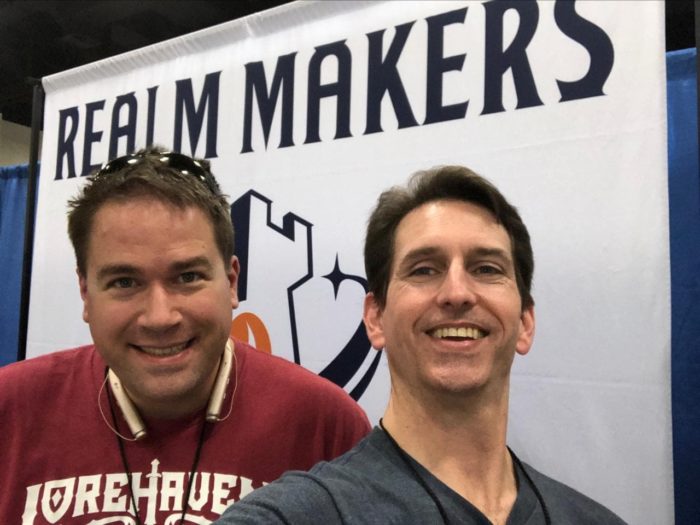
E. Stephen Burnett (Lorehaven magazine) joins Realm Makers Bookstore co-founder Scott Minor in Fort Worth. (Courtesy Scott Minor)
On the way to Nashville, bookstore operator Scott Minor2 told me about their South Carolina success.
“There were about ten to fifteen percent fewer attendees in Greenville, compared to Fort Worth,” he said. “But we sold thirty-three percent more books.”
To date, that means the bookstore set a new sales record at the Greenville conference.
“Everybody who came to the booth was excited to see the books,” Scott told me. “Groups of kids would come by four times looking at books. Then they would come back on the last day and buy the books that they wanted. … Some parents drag their children to a booth to check out something. … It seemed like our booth was where children dragged their parents.”
“Everybody who came to the booth was excited to see the books … Some parents drag their children to a booth to check out something. … It seemed like our booth was where children dragged their parents.”
— Scott Minor
I asked Scott if homeschool students really do uniquely value Christian fiction novels. Absolutely, he said.
“There’s a lot of Christians whose kids are reading these books, who don’t go to homeschool conferences,” Scott said. “The homeschool community is one that talks and communicates a lot amongst themselves when they find something good. They do spread the word pretty religiously. And they go there to buy books. That’s the purpose of going there.”
We both agreed that Christian creatives must share positive joy and win trust with new fans. That goes double when it comes to books with, say, dragons (or even vampires). Some books with these critters rightly trip the discern-alert for a Christian parent (or conference organizer!).
Scott said organizers and parents alike appreciate the bookstore‘s online catalog for homeschool parents. The catalog provides info about each novel the bookstore carries, along with author-supplied notes about the story’s content and themes.
Bookstore staff also reassure organizers that many of these authors were themselves homeschooled, Scott told me.
“They have come through a classical Christian model of schooling, and they are becoming writers,” Scott said. “When they use their imaginations, these are the stories that they come up with. These are the stories today’s generation wants to read.”
At several of these events, Realm Makers Bookstore hosts have met other fantasy authors, such as Andrew Peterson and N. D. Wilson.
Each of these creatives, often with his or her own publisher or organization, shares the goal of exalting Christ through fantastic tales.
“We’re hoping to open up the Christian side and change opinions about fantasy,” Scott said. “It’s easy to say, ‘Well, there’s good fantasy and bad fantasy’! The hard part for Christian parents who don’t read fantasy is knowing one from another. You can’t go reading it all. I try in my conversations to mention quickly for people that we have curated fantasy and sci-fi by Christian authors.”
Gillian Bronte Adams: ‘I loved seeing readers’ faces light up’
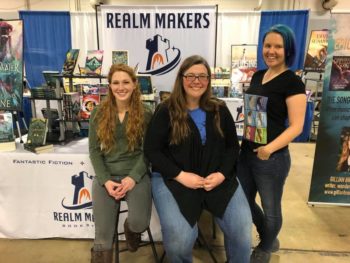
From left: novelists Gillian Bronte Adams, Amy Williams, and Catherine Jones Payne at Realm Makers Bookstore’s appearance in Greenville, South Carolina. (Courtesy Realm Makers Bookstore)
Two of those authors joined the bookstore in Greenville: Gillian Bronte Adams (The Songkeeper Chronicles series) and Catherine Jones Payne (the Broken Tides series).
I asked Gillian, “Would you like to write a brief paragraph or two about the South Carolina conference?”
Here’s what she said.
Because of our position in the convention hall, everyone walking down the aisle came face to face with our display full of books with robots, mermaids, fantasy creatures, and spaceships, and I loved seeing readers’ faces light up as they realized what we had to offer and made a beeline over to explore it all. Some of my favorite moments included:
- Opportunities to talk with parents about how “subcreating” and using our imaginations gives us a unique opportunity to grow in our understanding of God’s character as Creator. One mom expressed her thanks for the comment, explain that she had never considered it in that way before but wants to encourage her daughters in their creativity too.
- All the readers who came back to the booth to tell us they had already started reading and were “50 pages in” or had “stayed up way too late reading!”
- The teenage boy who explored the bookstore for a while before migrating toward Catherine Jones Payne’s Broken Tides mermaid series. “I don’t think there are books that are just for girls or just for boys,” he explained, “as long as the story is good!” Having heard many conversations about how most boys prefer reading about only male main characters while many girls seem to enjoy books with both male and female main characters, I was so encouraged by his perspective.
- The groups of young readers who visited the bookstore every day, sometimes multiple times a day. I understand the pull. When I was their age, I would have pitched a tent by the bookstore if I could!
Lauren H. Brandenburg: ‘It was like we opened a whole new world to them’
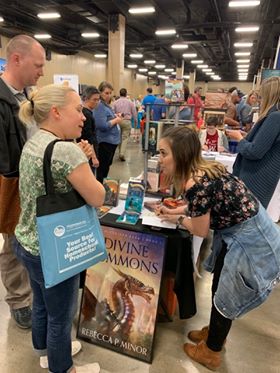
(Courtesy Lauren H. Brandenburg
Novelist Lauren H. Brandenburg returns this year to aid Realm Makers Bookstore in Nashville this weekend. She’s joined by writers Kristen Stieffel, Ralene Burke, Patrick Carr, and C. J. Redwine.
Lauren told me that last year’s similar event in Nashville was fantastic.
The homeschool catalogue. Parents loved that there was a place they could go to get detailed descriptions of a book’s content. As a homeschooler and author, comfortably telling parents that the books we provide were not only safe but written by Christian authors was so fun. It was like we opened a whole new world to them. Homeschoolers are readers and quite a few love the speculative genre. Personally, I just loved hanging with Patrick Carr and Rachelle Dekker. It was their first homeschool conference, so watching them being loved on by the readers was really cool. The conference is a special place and unlike any other book signings that I do. Scott and Becky have really stumbled onto something. Authors are fighting and scouring for ways to get books into the hands of the right readers. The Realm Makers bookstore is doing it for them. It’s a win, win.
Onward
I’ll hope to share more bookstore updates in the future, perhaps as soon as next week.
Meanwhile, I’ll represent Lorehaven magazine and aid Realm Makers Bookstore again, next month in Cincinnati!
For the future of Christian fantasy,
Stephen
- Several Christian authors of fantasy, such as Bryan Davis and Chuck Black, have been touring the homeschool convention circuit for some years. I hope to catch up with them for any of their comments in the future. ↩
- Scott and his wife, fantasy novelist Rebecca P. Minor, also co-founded Realm Makers: the conference. ↩


































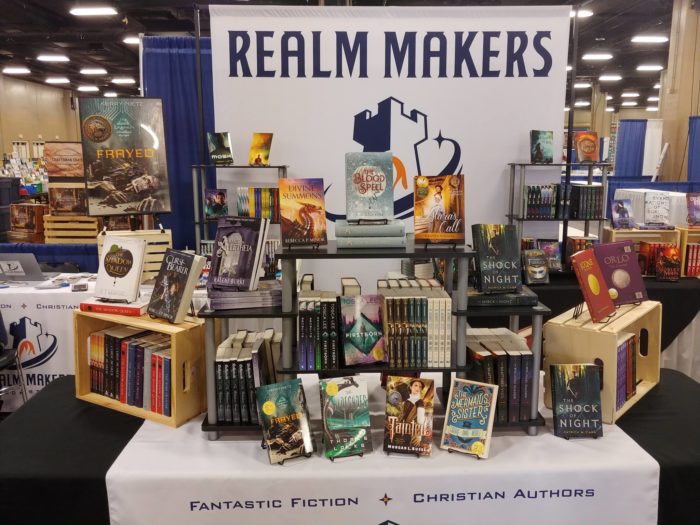




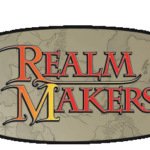
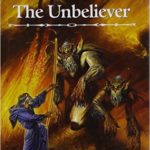


I wonder what the probability for manga-style works to diffuse into the Christian homeschooling subculture. There’s a few more obstacles, since comics look like * fun * and fun is a suspicious commodity in a hermetically-sealed, sanitized world like Christian homeschooling subculture. It would be harder to make it seem *edifying* unless it’s illustrated like Gray’s Anatomy (the original textbook, and not CERTAIN subjects of the original textbook).
Notleia, that’s just plain ol’ silly. Because if you meant that statement at all seriously, you would only demonstrated that you’re the one in a hermetically-sealed, sanitized world. Don’t be so over-sheltered or stuck in the past. It’s (insert name of current year). Many homeschoolers love to pursue happiness in their work and recreation like most other folks.
That said, I actually picked up a brochure from a comic publisher at the convention in Fort Worth. It featured some crazy zombie- and other critter-related artwork and storylines from folks such as Ethan “Axe Cop” Nicolle. I did not, however, see the booth or talk with these particular vendors.
Stephen, the younger homeschool families I have met, and especially second generation homeschool families, give me a lot of hope for homeschooling’s future. And it’s something I hope to trt with my own (future) kids some day.
BUT, notleia’s comment was not an unfair representation of my own family or of many of the other homeschooling families I knew in my youth. At lot of our parents reactions to many things were *fear* based rather than *faith* based.
I was homeschooled from 1st-12th (1997-2009) and it wasn’t until college and joining the workforce that I got much exposure to pop culture. That said I was a voracious reader, so there was no way my mom could pre-read everything. I got by with a lot if my mom hadn’t heard of it (so no Harry Potter) and the cover looked accectable.
True, a lot of that up there is a reaction to my situation and my dad, who’s one of those people who doesn’t really see the point of fiction unless it moralizes.
But hearing stories from other sheltered kids whose parents were overly concerned with keeping them away from corruption (or “corruption”), it’s not NOT a Thing in Christian homeschooling subculture.
There’s a comic book style bible/collection of bible stories, and I think some Manga style ones as well.
I was home schooled from seventh grade onward and still managed to get into anime. My art style with humans is kind of influenced by anime as well. I wouldn’t mind trying to market at least some of my future comics to homeschoolers, and there’s a decent chance at least some of them will like them. Really, it just depends on which homeschoolers you ask. My parents were perfectly fine with me liking anime as long as I didn’t watch anything too graphic.
I know about the manga Bible, but I don’t know if it’s any less of a gimmick than the lolcat translation of the Bible (which I don’t think has actually been published, tho).
My parents didn’t/still don’t really get my liking for anime. Too foreign for their experience, especially my dad’s. If it had been German modernist films or something, I think they would have at least a vague framework to understand it, but Japanese culture and aesthetics (especially kawaii culture) seem a bit too much for them to grasp.
It’s not that I don’t think that manga will eventually filter down to homeschooling subculture (it probably already has to some extent), it’s just that it has several more obstacles to overcome than sci-fi and fantasy which already had a foothold with CS Lewis and Tolkien, especially now that Tolkien is mainstream. Especially since Christian subculture comes up with ridiculous conspiracy theories like Pokemon being designed by Satanists to ensnare your children or yoga is a gateway for devil possession.
My parents don’t really ‘get’ my liking for anime per se, and have always been slightly wary of it. It’s just not their genre (my dad likes westerns, and my mom likes Karen Kingsbury and stuff) and they know anime can be bad sometimes. But they at least understand that it’s an art style/medium that can be anything the artists make it, so they never looked at it as something that’s inherently evil.
Notleia, my good friend has been working on this manga series (hand-drawn, full colored illustrations) for some time now: https://www.webtoons.com/en/challenge/the-emmaus-road-series/list?title_no=53893
Not sure if you’ve seen it, or if it’s your particular cup of tea (the art style), but I really enjoy it. I think it’s a bit of a “first step” in getting Christians on board with the genre. I’m not personally a fan of the Action Bible art, and the quality of the Manga bible isn’t that great at times.
I guess reheated Bible stories WOULD have to be the gateway, but reheated Bible stories do not intrigue nor excite me.
Not really a fan of his style, a little too chibi in the wrong way for my taste, but looking through a few of them, he has a pretty good sense of composition. Nice design for Satan-snake, but Satan in person looks a little too much like a knockoff Sephiroth.
It looks like he’s drawing on paper and scanning to digital. Maybe coloring in digital, but he’s missing a lot of tricks that would give his work more visual depth. Chiefly, layers. Just that one where Adam names the animals looks amateur because the animals look stacked rather than grouped naturally, which he could do a lot easier with digital layers.
His intent was to make a fully physical series and scan to digital. He’s doing it to grow his composition and anatomy skills, and get quicker at production. He’s never played FF7, so you’re reading a bit too much into it. Totally agree digital production would be easier, and offer some tricks he doesn’t currently have access to. It would be a lot quicker. In the future, I believe he plans to do more of a mixture. But for this one, he wanted to stick physical to grow certain skillsets.
Also, I totally understand your feelings on reheated Bible stories. I would say the Action Bible is reheated Bible stories. There’s hardly any actual artistic depth folded in. But I think you’re missing that it’s actually just as time consuming to “reheat” Bible stories, as it is to generate your own story. Try it sometime and you’ll see that doing it to any sort of quality is equally as difficult. And it’s called adaptation, which is a perfectly legitimate art-form. If you look through the section on the fall and the curse, you see a lot of artistic depth added to the story, so it’s really not giving him enough credit to throw around the phrase, “reheated Bible stories.”
Unfortunately, effort on the part of the artist does not necessarily correlate with the amount of interest I hold in his project.
Lol I’m not trying to convince you to be interested. Just saying that it’s misrepresenting (also disrespecting) the skill and artistry to call it “reheated Bible stories.” It’s snobbish, and makes you appear naïve to the fact that it takes the same amount of artistry to do it.
In terms of actually sitting down and drawing the stuff, it takes the same amount of artistry/work. But in terms of coming up with an entirely different story, AND designing the characters/world to go with it and THEN trying to draw that…original stuff takes way more artistry and energy, for the most part. Trust me, I spend a lot of time working on both fanworks and original stories, and starting a new thing entirely from scratch is way harder.
Here’s a biblical fiction story that you two might like to look at for curiosity’s sake, if nothing else. It comes at the story more from a Jewish angle than a Christian one, though. And I have linked it before, but it’s been rebooted since then and the plot has changed. And no, it’s not a reheated Bible story, even if it starts with a scene from the Bible:
Rose of Sharon by Haleviyah Epstein: https://tapas.io/episode/380544
Also, this one isn’t biblical fiction, but it’s a comic that at least looks like it’s done in traditional media, so kind of relevant:
Africa by Panthera Arven:
https://tapas.io/episode/211478
I make a decent part-time living writing adaptations. I totally disagree. You’re writing fan-fiction. That’s different from commercial-grade adaptations of other stories. It may seem easier on the front end, but to do it at a professional level takes every bit as much artistry–especially when what you’re adapting doesn’t seem to have an obvious narrative arc with strongly developed characters (which is the case in many Bible stories). You have to GENERATE that story arc and strongly developed characters within very strict parameters that still match up with what’s given. There’s a reason some screenwriters excel at original work and don’t excel at adaptations – and don’t get hired to write them. Every story is a rehash of previous stories because the structure will follow a preconceived framework. If it doesn’t to some extent, it will fail as a story.
Even if that’s the case, I posit that Deibiddo is not on the level of “professional,” whatever that means. He’s doing Bible fanart, basically, but if someone wants to pay him for it, power to him.
Obviously you know what a professional is if you can say he isn’t one.
Well, barring being sued by an industry-aligned entity, you can say you’re a professional if you’re getting paid by someone to do it, desu ne?
But my comment about Bible fanart still stands (and my hope he gets paid for it).
The plot notes for the current Naruto fanfiction trilogy I’m working on is over 100 pages long, and that doesn’t even remotely cover everything that needs to happen in the story. And that’s just doing a novel version. If I were to turn that fanseries into a comic, it’d be a lot harder since I’d have to do lots of character designs for the OCs, etc. (Even this fanfic of mine has tons of original content) And sure, I don’t have an employer putting pressure on me for quality and deadlines, but that doesn’t mean that it isn’t difficult, and that doesn’t mean that fanworks can’t be commercial grade. I’ve seen fanworks that are way better than so called commercial grade stuff.
But, even the fanfiction I’m working on is nothing near the difficulty of a lot of my original works. Why? Because the Naruto storyworld already has characters, situations, etc. for me to work with. There is already a setting, a world map, characters, and even the already formed perceptions/knowledge of the audience. Working within those parameters can be hard, but at least I didn’t have to come up with them in the first place.
With my original works, on the other hand, it’s daunting and full of brick walls and discouragement because starting out, there is nothing to go off of at all. With my current WIP, for instance, I started off with like, two or three tiny ideas. And it’s taking forever to figure out everything I need to finish the series. It’s come pretty far in the last six months to a year I’ve been plotting it out, but as much as I enjoy it, it feels almost like an impossible task to figure out the sheer amount of things that need to be done still. And that’s not even counting the writing and drawing part.
Some of that is required for adaptations, but not nearly as much. There’s already a lot to work with when it comes to adaptations, or even just writing in a preexisting storyworld. But adaptations are kind of like ‘Ok, I pretty much already know the story, so how do I tell it well?’ or ‘I have most of the story elements already, now I just need to pull all the info together and consider how the chars might behave in a slightly different scenario.’
That’s a different matter than having to come up with Every. Single. Thing.
So yes, adapting something, or even just making fanworks, can be very hard and take lots of artistry. That said, I’ve thought about doing adaptations of fairy tales, etc. as a way of (finally) getting a few projects done and published, simply because I know those would be much shorter projects, take far less energy, and to an extent have a built in audience. But I’ve sorta avoided that because I’d rather make progress on my original works.
Writing adaptations IS hard and not everyone is good at it. (And some stories are easier to adapt than others) And of course every story does borrow from something, whether it is pop culture, legends, etc.
But I don’t mean original in the sense of ‘this story borrows from nothing and has no resemblance to anything else.’ Original in this case is probably more along the lines of being inspired by something or using it as a reference, but still making something that is pretty much new. With my Faust inspired story, for instance, I took the deal-with-the-devil idea and used it as a story element. But, it’s wildly different and way more difficult/complex to write than the Faust play I read a few years ago. Faust doesn’t even exist in my ‘Faust story’.
Adapting that Faust play I read into a comic would be far easier than trying to write my Faust inspired story.
Is historical fiction easier to write than a thriller? Not at all. Is historical fiction easier than fantasy? Anyone who publishes both will say, “Of course not. They’re just different.” And, actually, many times writing historical fiction (which bib fic is a subgenre of–so long as you consider the Bible narratives history) is much more time consuming and labor intensive. Once you have a solid understanding of structure and have experience writing original story worlds (meaning that you’ve finished a few projects), you’ll see that the ease with which you generate story worlds goes up massively. I’m not saying fan-fiction isn’t hard. But going through the actual publication process is a serious wake-up call. I’m also not saying you’re “incapable” of writing professionally. I’m sure you could do it just fine. But being subject to professional editorial feedback and the myriad pressures and requirements of being under contract changes your perspective and unveils a lot of weaknesses you’d never pay attention to on your own. You can only say that historical fiction is easier if you’ve not gathered the experience yet. I totally understand your difficulty in generating a story world. I had the same exact problem. But the problem isn’t that it’s harder. Once you gain more experience in understanding how to craft a story world and structure a story and character arcs, you’ll see it’s not as difficult as you feel it is now.
My first book took me 4 years. It was a blend of fantasy and bib fic (because I used to feel the same way as notleia about bib fic). I had to craft the story world from the ground up (yet have it fit within the narrative given). My second book, same deal, took me 6 months. My third book, which was straight fantasy, 2 months. My fourth, which is more straightforward bib fic based on Babel, I still had to craft the entire story world because there’s so little known about the period. 3 months to write the story and draft. About 2 months to edit. The difference in time taken has nothing to do with any of the projects being easier or harder than the others. They were all unique. The difference in time taken was completely contingent on my level of experience and personal diligence. I thought I knew what I was doing on my first book. Looking back, I can confidently say I had zero idea what I was doing. I now realize I’m still barely competent with structure and character arcs–even though I’m way more experienced than I was then. That first book still got published by a publisher, but I was way more inexperienced than I thought. I have experience in writing straight fantasy, straight bib fic, and also was hired to adapt a true story to a screenplay (which a production house has committed to filming). That experience was massively eye-opening. Because the experience of writing to contract and in collaborative settings has completely changed my opinion on the writing process and on genre. Again, I used to feel exactly like Notleia about bib fic. I considered it a cop-out, and that it was basically Bible fan fic. I had zero desire to “regurgitate Bible stories.” I felt like people only did that when they lacked personal creativity. Then I tried my hand at it, and realized I had been very naïve. It was just a foolish and snobbish perspective. I also realized that prolific writers of every genre have an understanding of structure. And once you understand structure, it massively simplifies crafting story worlds, character arcs, plots, etc., because you’re basically regurgitating a structure that has already been used a million times, only making adjustments same as you do with historical or bib fic. You can have head knowledge about structure (I’m sure you have quite a lot), but finishing a project is really where it all gets settled into your toolkit and makes writing easier.
Blessings on finishing your original project. I think you should just go full-force on that. If you email me, I’ll send you some things that have been very helpful for me in crafting and structuring stories and character arcs — things that massively sped up my writing process. May not work the same for you because everyone’s different, but a lot of this stuff I wished someone had just told me at the beginning. Would have made my life a lot easier. Again, I’m not a master at this stuff. But I’ve gleaned some things that have been very helpful for me from people who are masters at it, like Susan May Warren (yes, a romance writer, but she’s fantastic at structure and character arcs), etc.
Historical fiction vs a thriller is kind of not a great comparison exactly. I don’t read many thrillers, but it sounds like a lot of them tend to take place in our world, just in a different time period and with different goals maybe. So basically, both are fictional stories written to take place at a certain time on planet earth. So those two genres don’t necessarily work for an adaptation vs original comparison.
It sounds like, for you, some of the hardest parts of Biblical fiction have been the original parts. And if you are having to generate most of a Biblical story because there’s practically nothing there in the narrative, that probably leans more toward the story actually being original, rather than an adaptation. Drawing inspiration from something/using it as a reference, as I mentioned in my previous reply. Though originality exists on a spectrum.
With time, yes, stuff becomes easier to write. But in a lot of ways that doesn’t change the amount of stuff that has to be done. Comparing my Naruto fanfic with one of my original series of a similar scope, the Naruto fanfic is mostly easier. And that’s because, although I’m pretty much going through the same process to write the fanfic and the original stories, many of the steps are already accomplished with the Naruto world. With the fanfiction, the world/chars are already there and I can just jump to figuring out what the characters would do in a particular situation.
I don’t really see Biblical fiction as a copout, and I do borrow things from the Bible now and then. Though it does get a bit tiring to hear people trying to tell the same Bible stories over and over. Making a good adaptation in and of itself (for Biblical stories or otherwise) is often less difficult than starting from nothing(though still very hard). When it comes to the part you mentioned about working with a studio/under contract… Working for someone sounds easier from the standpoint of being able to get feedback or possibly having a team to bounce ideas off of, but difficult in the sense of meeting the studio’s requirements and the complications that come from working with other human beings.
So, like, someone can make a good, likeable adaptation, but that doesn’t mean the studio will like it/want to produce it. But that’s more about the studio’s needs and process, not the difficulty of writing adaptations itself. But, it’s fine if we disagree on what we see as more or less work. I kind of wanted to put another opinion out there to address some things, but I don’t expect you to agree. 🙂
I’m mostly satisfied with my world/character/plot building methods, so it’s probably more a matter of continuing to gain practice and experience than anything else, since of course actually applying concepts doesn’t happen immediately. Time hasn’t been on my side as much, in terms of having uninterrupted hours to just work on my stuff, but hopefully I can make more progress once the current college semester ends. Practicing my digital art is a pretty big priority as well, since although I’ve made progress I’m not anywhere near where I want to be with coloring, lighting, etc.
I’ll take a look as Susan May Warren’s stuff. If you’re still looking for resources, I’d recommend checking out Brandon Sanderson as well, if you haven’t already. He has recordings from his college writing lecture up on youtube, and they’re an interesting/helpful listen. Also, I haven’t been roleplaying lately, but roleplaying improved my writing(and social skills) by leaps and bounds during highschool. So roleplaying or at least reading other people’s roleplays can be pretty helpful.
Thank you for your well wishes on my project 🙂
Yeah, the biggest part is just finishing a project. I’m sure you’ll figure out what is most important for you to nail down and be able to narrow your focus, because 100 pages of story notes is way more than necessary. I’m sure you’ll get streamlined and it’ll take less time. I work a full-time job on top of writing and having a family (wife and daughter). Time is never on our side, I don’t think. I’m just saying that as an encouragement that it can be done faster, and to the same quality.
What I meant about writing under contract is that you have to put out certain quality work in a very limited time span. The pressure of that does things to you. It helps you tinker less and figure out the most substantive work and focus on it. And you’re right that the short feedback loop helps you learn faster and get better faster and put out better work quicker.
I was actually thinking of Sanderson’s lectures when reading your comments. Figured you’d watched them. You’re right, they’re very good. For Susan, her advice on the “The Dark Moment” (or maybe it’s “black moment”?) has been very helpful to me. It’s adapted from scriptwriting techniques. Very simple, but very helpful because it’s so simple. Basically, your character has one wound. The story is about them overcoming that wound or otherwise succumbing to it. Story, in itself, is primarily about significant change through conflict (or friction). If there’s no significant change, it feels hollow. The Dark Moment technique helps keep you focused on the characters’ significant change while plotting and designing character arcs that interact with each other. Complexity comes from focus (simplicity) and clarity. Ex. from Harry Potter. Harry has identity issues because he was orphaned. His entire story is focused through the lens of him grappling with his identity. The little goals that shift along the way keep him on the path toward that overarching goal of figuring out his identity, or coming into his identity. Complexity through focus and clarity. Each character has a simple main focus/wound (i.e. they’re understandable and therefore we can have empathy for them and are interested in them, though some characters’ wounds are held from us, like Snape, to be used as red herrings and cast doubt). The way they interact and impact each other is where the twists and turns come from. That’s, in a nutshell, the most helpful piece I took away from her advice on plotting/character arcs.
With regards to writing historical or biblical fiction, the sheer volume of research you have to do replaces the work of generating a world from scratch. If you LOVE research, and have a knack for remembering it, you may find historical fic a tad bit easier. But it’s a hard road both ways. I personally find generating an original story world much easier. Publication times tend to be wider between historical fiction releases than between epic fantasy releases for a reason. Nothing is completely original. Nothing. You’re always patterning your stories off of what’s been done before.
Yeah. One reason that trilogy has over 100 pages of notes is the way I take notes in the first place. Exactly how a feeling or idea is expressed, and exactly how a scene goes down, is very important, so parts of my notes can be a detailed summary of a character’s thought process, or a snippet of a conversation because there are many times when it’s vital that I remember the exact idea of how a character words something. The way I take notes wouldn’t be so great if I was working on a team, but seeing as I’m going indie and being a total lone wolf about my projects, what’s most important is taking notes in the way that helps ME figure out the story best, and structuring my notes exactly like a huge production team would might actually hinder my writing process.
But my fanfic trilogy’s notes are also long because it’s a very huge project with tons of character and plot development. I have smaller projects that aren’t nearly that bad. There’s a little story I’m going to try to start doing a comic version of after this college semester’s over, and hopefully I can post a little of it up online before the next semester begins. But, I figured out a way to make it short(for me), which is basically going to be by making it more of an interesting narrative style, rather than showing the whole complicated story in detail. But, it’s probably going to be more of a prototype than anything else, since some day I probably will want to do a reboot or even a sequel that has a more detailed story to it.
I think I remember Bryan Davis talking about black moments on his blog. The idea is a good one, and I incorporate tons of black moments, which is partly influenced by watching lots of tragic shows.
Research is still a pretty big deal for me with a lot of my stories, since even though I don’t intend to make everything perfect, there’s still the goal of having the story make sense and feel workable. In fact, research is often something that breaks me out of difficulties and helps me come up with important plot points. Or at least helps with figuring out a character’s motives for doing something.
Not every adaptation is going to need tons of research. Biblical ones often will, if someone is determined to make it accurate(not everyone bothers). An important thing when comparing original work to adaptations, though, would be the size and scope and all that. Adapting Little Red Ridinghood into a short comic(without changing the story from the version we were taught as children) would probably be comparable to me trying to come up with a short parable comic thing from an original idea I have. Technically, Little Red Ridinghood would be easier, just more boring for me since even though I like that story, that doesn’t mean I feel like working on it.
(I think you’re fine without his advice.)
lol… of course she’s fine.
Well…I am, and it’s true that I didn’t ask for advice. But I did express difficulty with my writing, so it’s understandable that he would offer help. He was being nice and I don’t resent him for it. At the same time, I do appreciate your words, so thank you 🙂
I didn’t mean that sarcastically, by the way. I was being sincere (the “of course she’s fine”).
One thing that does seem kind of hard is when someone asks if a story’s appropriate for their kids or not. It’s hard to know where a parent’s exact rules are, and therefore whether or not something subtle in a book will be ‘bad’ in their eyes or not. Most of my stories are for teens and adults, so I can say that at least.
I don’t want to recommend a book that will make someone uncomfortable, even if only accidentally. At the same time…I don’t know. If I asked the parent enough questions and talked with them long enough to know that they are extraordinarily picky with morals in books, I might just recommend that they read the book first and then decide from there whether or not they thought it was ok for their kid.
I’m not surprised that homeschoolers are so interested in Christian speculative fiction. As a homeschooler, reading was heavily encouraged and a lot of my fantasy reading was counted as schoolwork. When we were younger, a significant part of our school day was our mom reading aloud to us from series like the Chronicles of Narnia and the Terrestria Chronicles, a medieval fantasy allegory similar in style to Pilgrim’s Progress with characters like Sir Wisdom and Discouragement. In high school I found authors like Anne Elisabeth Stengl, Jill Williamson, and Andrew Peterson and collected a whole shelf of Christian speculative fiction. I feel that homeschooling encouraged my love of reading, stories, and fantasy. In addition, all of the people that I have found who also loved Andrew Peterson’s series the Wingfeather Saga have been homeschoolers. While almost nobody knows about Christian fantasy or the series I love, more homeschoolers have recognized them than non-homeschoolers. I think something that people don’t realize about homeschoolers is that we like to find ways to count fun things as school. Trips to zoos or museums count as science or history, playing outside or doing Just Dance on the Wii can count as PE, and reading fantasy novels can count as English. I think it’s less of an attitude that nothing can be just for fun and everything has to be educational or it doesn’t have value, but instead a realization that we learn more naturally when we’re having fun. Why not take advantage of every opportunity to learn instead of forcing kids to learn in one specific, boring context. That flexibility and willingness to use unconventional curriculum is why I think homeschoolers are the perfect market for Christian fantasy.
[…] Realm Makers Bookstore Takes Fantastic Christian Fiction to New Fans […]
[…] (Browse the bookstore overview here. Or read my in-person reports from Fort Worth and from Cincinnati in past months.) […]